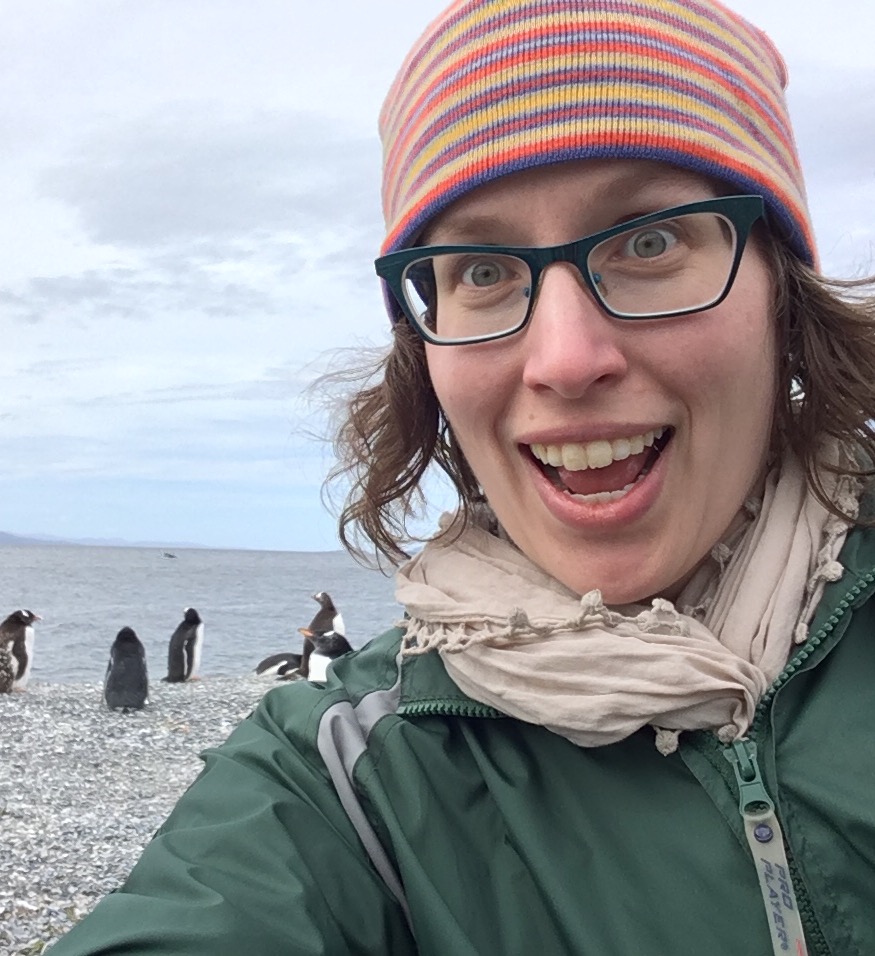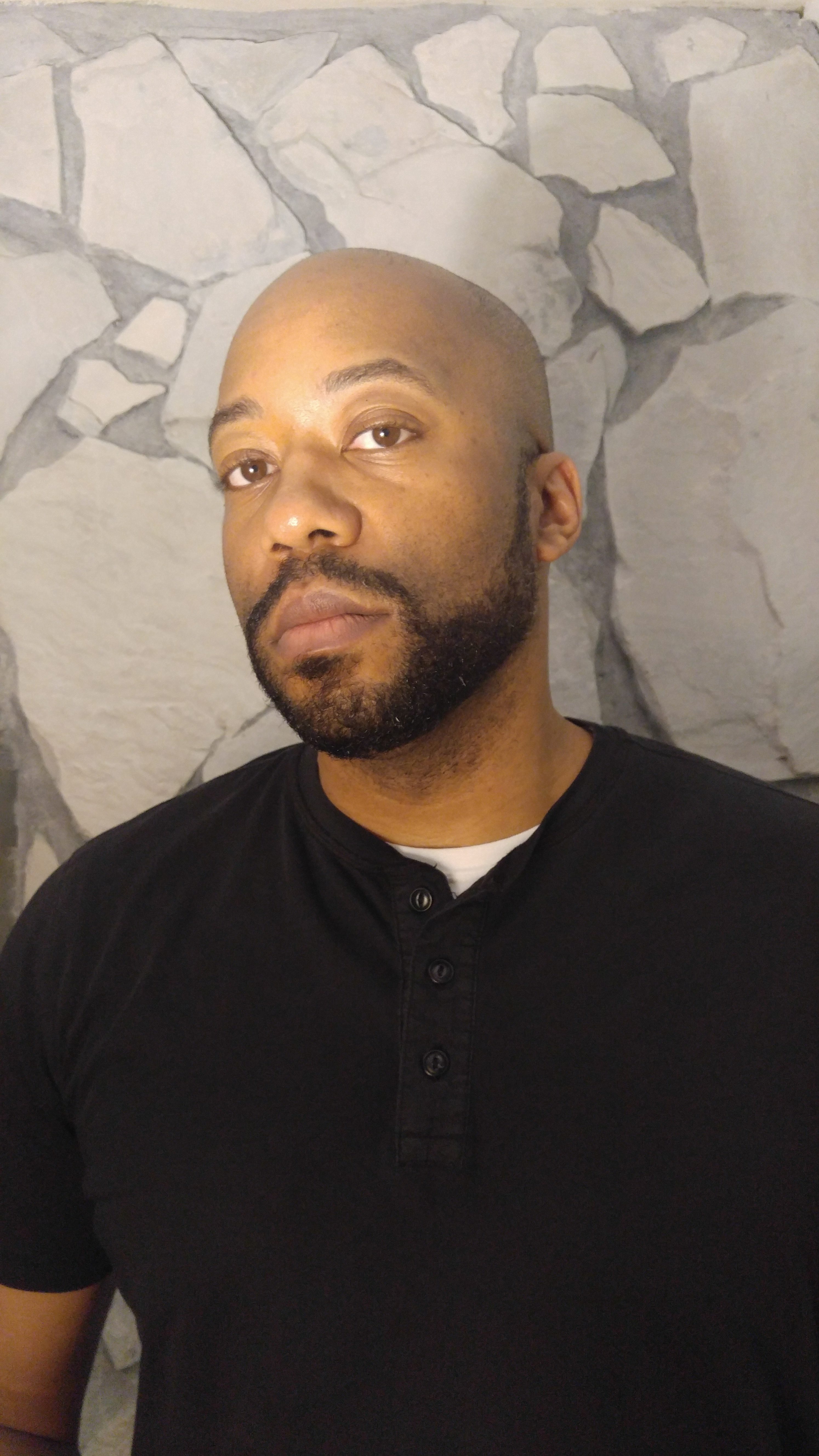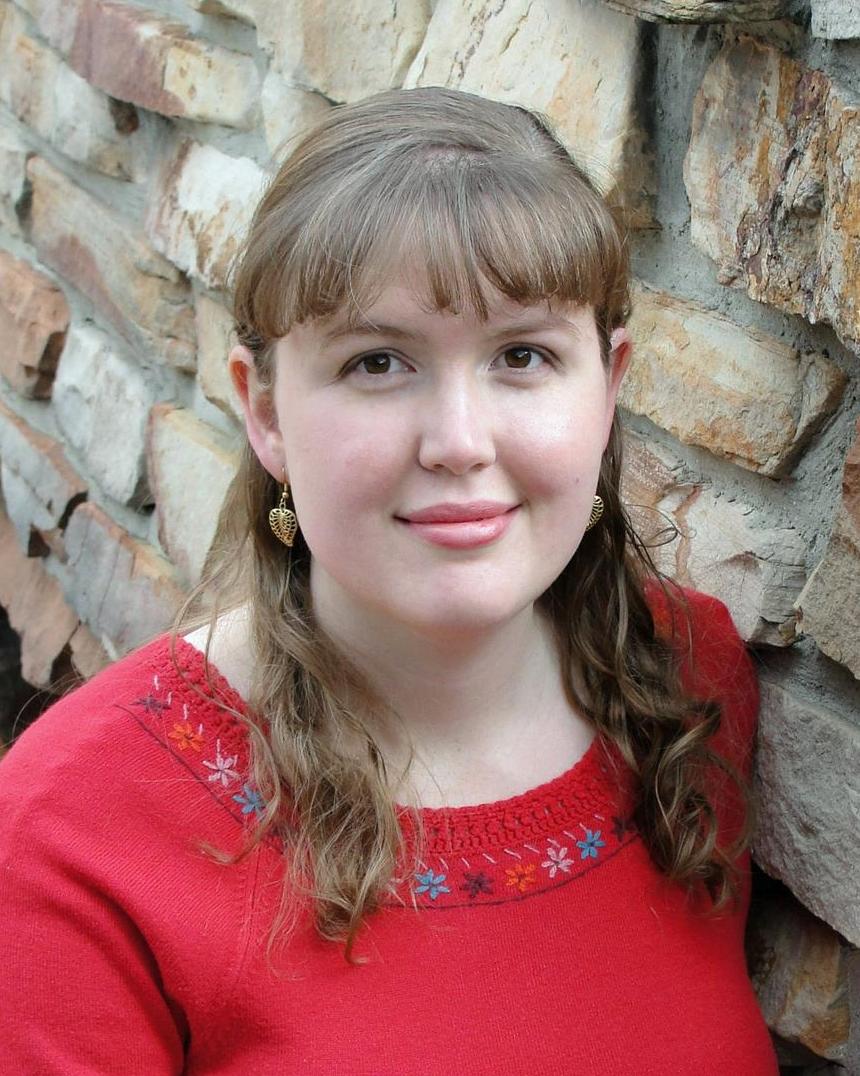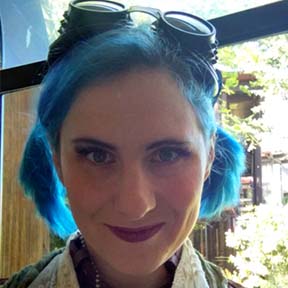I showed up early for work, as always. The airport’s underbelly was the ugliest place in Boston, but I would’ve spent every hour there if I could get away with it. Among the hurried machines and distant reek-sweet jet fuel, I had everything I needed. A purpose, a paycheck, a place to hide; and most of all, a land of function without beauty, where nothing would tempt me to invest it with holiness and life.
The other officers grunted hellos as they arrived, and we split up into pairs for our little contributions to the safety of mankind. My supervisor Darrell beckoned me to him once again, and I took my place by the conveyor belt, pleased for the company of his press-perfect uniform blues. I had never let him know me, as I could let no human know me, but he had come to appreciate me despite the dull mask of my restraint.
I brushed clay dust from my uniform, tugged on my gloves, and watched humanity’s obsessions trundle toward the scanner. The belt hummed with the comfort of purposeful movement, content with suitcases and backpacks and baby strollers. A hard-shelled bicycle box wedged against a chute, and a light blinked amber as the conveyor belt clunked to a halt.
I leaned over the belt, and hauled the box into my arms. I’d hoped for something truly heavy, but it weighed no more than it looked. I pretended to exert myself as I carried the box to the scuffed steel examination table, and set it down beneath fluorescent lights and Darell’s sampling wand.
He chatted in his rhythm-quick voice as he jiggled the latch and drew out his ring of master keys. On the third try, the lid swung open. He whistled. “Wow. Ever see something like that, Jakob?”
A glossy bronze shape lay nestled in a bird’s nest of packing paper. The sculpture had the shape of a stylized motorcycle, sleek and long and stubby-piped, like the dream from a Hell’s Angels Science Fiction Club. Its metal engine gleamed in the harsh white light, as if it had just emerged from the workshop of some loving hobbyist, awaiting my word to roar down the open road.
A word I could never permit myself to give, despite the longing that beat through my chest like blood.
Darrell tapped his wand against my wrist. “Slow down, big guy.” I yanked back my hand, and he said “Can’t imagine a bomb hidden under this much work, but we still gotta check.”
I laced my fingers together as Darrell swept his wand over its surface. I had spent so long avoiding anything built and beautiful. I’d almost forgotten the sensation of their call, the gravity of their appeal.
This was no airplane, vomiting exhaust into the atmosphere; no luggage cart on the journey of a materialistic ant. Nor was it a golden calf, stealing hearts from the Creator. The sculpture existed, and made the world a better place for it, like a brother you never knew was alive.
Darrell levered the sculpture upright, one wheel toward the ceiling. “Yeah? What do you think? You like it, big guy?”
“Yeah,” I said.
He laughed. “That’s why I like you on my crew. You’re a great conversationalist. But yeah, it’s nice. Wouldn’t mind one of these hanging over the TV or something. Hold it for a minute?”
I balanced the sculpture in one hand, and let it tilt a few degrees until its surface rippled with white bars of reflected light. Darrell probed the box’s packing-paper corners with his wand, and then turned away and inserted it into the reader.
I had spent most of my life avoiding this temptation. Months upon months of dull repetition, back and forth between empty apartment and empty work, shaping myself into a useful cog of civilization. I’d survived undiscovered for so long, surely I deserved a few moments of fulfillment. One risk today, averaged over three years, left me comfortably safe.
I lay my hand on the sculpture’s headlight, let my fingers sketch the shape of letters, and laid the motorcycle back into its nest.
Some legends said the mark should read truth, others spirit, or a full Adonai Elohim emet, the Lord God is truth. But for me, anything will work. My fingernail left no impression on the bronze, but the clear cool presence of my gift flowed from hand to metal, like the release of a long-held breath.
I slammed down the lid.
“Jakob? What was that?” Darrell’s voice had lost its rhythm. He studied me not with wide-eyed surprise, but the narrow gaze of skepticism.
I froze. What had he seen? What had I done, in my moment of temptation? I shifted position, my body between him and the box. “You said all clear, right?”
He cradled his radio. “Yeah. All clear, Jakob.”
I hauled the box onto the outgoing conveyor belt, toward the rubber-strip curtain between our screening area and the automated paths beyond. Maybe nothing would happen. Maybe my power had faded in the years since I last gave life. I might’ve imagined that flow of power. Maybe I’d always imagined it, in hallucinations bubbling up from the lack of some medicine or construction in my mind.
The motorcycle would vanish into a cargo hold, a simple sculpture, able only to move by the gift of an airplane’s engine and fuel.
The box swiveled, jostled by a sudden motion within. Black plastic clipped the curtain’s steel frame, and the box passed through the curtain and vanished from sight.
Darrell’s gaze bored into my back. No, my imagination, my fear. Warranted, though. I’d stayed far too long, in the lure of a steady job and my self-control. My mistake.
“Taking a break,” I said, and hustled toward the exit.
***
The late-October wind cut through my uniform jacket as I knelt by the ocean’s rocky shore, a false coast constructed by bulldozer and dredge. A stone’s throw from the runways, and the only place where the airport would allow me a sliver of comfort.
My cellphone buzzed in my pocket, but I couldn’t bear a glimpse of modern design. I wanted to hurl it into the waves, to awaken it to life, anything. I focused on the salt-sodden chill of water in my socks, the splash of waves over my boots. Water full of jellyfish, barnacles, and seaweed. Every plant and animal already true in form and function, alive by the Creator’s breath.
Beautiful but quiet. Nature laid no demands on me. My one chance to touch grace without it begging for my aid.
My pocket buzzed again. I had thought the airport would shelter me behind its utility and ugliness, but temptation had found me nonetheless. Darrell had seen me. I imagined hurling my phone into the water, fleeing from my job. I could disappear into some wilderness, far from any man-made creation that could tempt power from my fingertips.
Behind me, something zipped along the runways. Too low for an airplane, too swift for a maintenance truck. Maybe it was the sculpture, broken free of its box, enjoying the animate life I had given it. The sound faded, and I could not tell how far it’d gone.
I drew my phone with a wet-fingered tug. The cracked and blocky device settled in my hand, its shabby exterior muting the whispers from within. The buzz had been my weekly reminder to make a deposit into Saba Haskel’s fund. Once, the money had paid for his nursing home. Now, half of it went for his burial plot, and the rest to his chosen charities.
My thumb hesitated over the screen. Saba Haskel’s commands had faded in the seventeen months since his passing. If I unyoked myself from his debts and generosity, I could make my escape, and discover the shape of a life molded around my own needs.
I huffed a quiet half-laugh. As if I doubted what I might do, despite all the free will breathed into my soul. Saba Haskel had built himself a dutiful son.
I tapped my way to a banking app, and transferred over my last few hundred dollars.
No job meant no paycheck. I might keep them both, if I could talk Darrell down, if I could just walk back into the inspection line. I would have to try. I dipped my fingers through a receding wave, and then turned back toward the terminal’s lights.
***
My badge opened door after door, back from tarmac to fluorescent lights and then the cavernous rumbling space of the inspection room. I reached the conveyor belt, snapped nitrile gloves over my hand, and then halted. One of the other inspectors waved me over, and pointed her thumb at a video camera watching from the corner. “Boss wants to talk to you.”
So much for a return to the inspection line. I peeled off my gloves, and cradled them in my hands as I stepped away from the belt’s welcoming hum. I eyed the poor nitrile, wasted before it could do its work, and then tossed the crumpled gloves into the trash.
I passed through the garage where rectangular luggage carts slept in their peeling orange paint, waiting for a tug to drag them onward to a luggage-laden airplane. I swiped into the back corridor, and then again to access the control room.
A wall of monitors blinked at me, filling the room with their grainy light. Darrell paced behind the desk, and his phone rested on the surface with a satisfied glow.
I put on a dull expression. “What’s this about?”
Darrell shook his head. “Two years ago, couple months after you started here, I was told to keep an eye on you. I started to think it was nothing, you know that? But now, Jakob. That statue. What the hell did you do?”
I sat down in front of the desk, slid my hands along the frail plastic of the chair’s armrests, and tried to imagine who might’ve asked Darrell for such a favor. “Don’t know what you’re talking about.”
He halted, crossed his arms. “Thirty million passengers come through here every year, counting on us. Don’t you bullshit me.”
His uniform clung to his body, armpits dampened by sweat. Whether he feared for our passengers, or himself, I had no idea how to protect him. Every word faltered in my throat, inadequate and profane.
Darrell tightened his lips. “You know the real Jakob Haskel died before his first birthday? I just learned. But I bet you always knew.”
I forced my head to shake as slowly as ever. “Don’t know what you’re–”
He tugged open the desk drawer, and heaved a tangle of bronze onto the desk. It had once held the shape of a motorcycle’s front end. Its wheel had gone flat, the struts accordion-crushed like hollow aluminum after a crash.
The axle spun once, then shuddered to a stop. It turned in the opposite direction, skipped once, and stuck.
He said, “I don’t know what’s up with this, so we’re even.” His phone chirped, and he glanced at the screen. “Sit tight, Jakob. If you don’t wanna come clean to me, maybe I don’t know you so well after all. But the lady from the NSA will get answers out of you, one way or another.”
Plastic buckled beneath my fingers. Even if the National Security Agency fought for a worthy cause, they were who they were. No weaponsmith ever made the world more peaceful.
I leapt to my feet, but Darrell was already past me. He opened the door, and admitted a woman wearing a black suit so rumpled and careworn it wanted to slide off on its own in search of a sewing machine.
She ignored Darrell. She stared at me, and her bittersweet smile gripped me with the certainty of prayer.
She said, “I’ve always wondered whether Doctor Haskel made you in his own image.”
“You knew Saba?”
“I was his last graduate student.” She drew out a pair of business cards, one for Darrell and one for me. “And I know exactly what he was working on before he retired. Praxis derived from 16th century Praguer variants of the Sefer Yetzirah.”
Darrell squinted at the card. “Hold on. Doctor Menkin? You said you were from the NSA.”
“No, sir. Dr. Rebecah Menkin. I was at the NSF, at least when we spoke a couple years ago. The National Science Foundation.” She circled the desk, a hawk untroubled by the errant gust of Darrell’s question. She rested one hand on the motorcycle’s cowl and met my eyes. “I’ve spent the last six years trying to track down Saba’s final project. I chased every link I could find. Including the name.”
Six years. Since long before Saba awoke me from clay. “What do you want from me?”
“Come with me. We’ll recreate Dr. Haskel’s work, and finally get it published. The world deserves to know he was right.”
In the depths of my bereavement I might’ve leapt into her hands. But Saba had returned to dust, and his pride with him. If his work spread, the world could see more creations like me. Half souls, cursed by the temptation of life and beauty.
I said, “No.”
“Let’s not make this adversarial, Jakob.” She smiled, but her eyes resisted, as sharp as a dream’s leading edge. “Your boss told me about your talent. Let me help you understand it.”
A wise man hears one word and understands two, Saba used to say. If I left with this doctor, I’d spend the rest of my days in a lab, under microscope or scalpel or drill. I’d become one more metal to smelt from its ore, in the humans’ endless hunger for new methods of creation.
I said, “Darrell. I’ll talk to you, but not this woman. Get her out of here.”
Darrell pushed past Dr. Menkin, jammed a key into a desk drawer, and yanked out a taser. He swung the black-and-yellow barrel back and forth, between the woman and me.
He said, “Doc, you need to leave. I may not understand what Jakob can do, but whatever it is, it needs to serve our country. Not some scientist’s career.” He unclipped his radio. “You both stay right here while I find a number for the real NSA.”
Menkin raised her hands, palms out, her voice calm through gritted teeth. “I understand your concern. But let me put you through to the NSF’s director instead. Appointed by the President.”
Darrell said, “You said you don’t work for them anymore.”
“It doesn’t matter where I get my paycheck. The Director knows my work, and how important it is.”
Darrell hesitated. Menkin drew out a phone with a glass-and-aluminum case, sleek and alluring. The taser faltered in his hand.
I could let Darrell make his phone call, or I could crush the weapon in his hand and leave with the doctor. Either outcome would mean the same. I’d spent all these years suppressing the temptation of life. I had never created for my own gain, and neither reason nor logic would make me kneel before a worldly master.
As they argued, I smashed the door out of its frame, and fled into the echoing airport.
***
I ran into the garage, and wove through double-decked luggage carts as shouts mixed and rose behind me. Two voices, man and woman both. My pursuers fell further behind with every stride, unable to match me with mere muscle and bone. I aimed for the fire exit’s red-lit words. A one-way door, impossible to lock, to the tarmac and the respite beyond. Darrell and all his brethren could not catch me.
I glanced over my shoulder. He held his taser in one hand, radio in the other. Dr. Menkin unrolled a piece of parchment and shouted Hebrew syllables into the echoing air.
My joints stiffened. I lurched, almost tripped, my clay thickened and dried by the power of her words.
A roar of frustration escaped my throat. I grabbed a cart’s aluminum frame, and yanked myself around to face my pursuers. Menkin and Darrell converged on me, ready with taser and scroll, with lost faith and innocent greed.
Saba had taught me restraint, but if these two wanted so badly to know me, I’d show them my potential. I bent down by the luggage cart, dug my fingers into a tire’s stiff squeaking rubber, and exerted my full strength at last.
I lifted the luggage cart over my head. Dr. Menkin fumbled in her jacket, her face pale. Darrell stepped back, his taser leveled in shaking hands. “Jakob, calm down. You don’t want to do this.”
Those two poor creatures, merely trying to fulfill their purposes handed down by job and school and Creator.
My rage crumbled. I lowered the cart onto the ground, gripped one of its roof’s steel struts, and traced my finger against metal and dusty orange paint. My gift seeped into the metal like water into thirsty earth.
The engineless cart set its wheels against concrete, and whipped into a three-point-turn. It nosed back and forth, an animal uncaged and sniffing for something to carry. It aimed itself toward Darrell and Menkin, and its wheels spun with an acrid burnt-rubber spark.
Dr. Menkin fell, a yelp of pain as the cart bumped over her leg. Darrell leapt onto the cart’s onrushing edge, but it caught him on the upper corner. He clung, legs kicking, as it swiveled around its parked and waiting brethren. His taser clattered onto the cart.
My muscles loosened. Darrell tumbled to the floor and crawled away. The animated cart slowed, and then spun and braked, a skidding turn that slid the taser into a stable position at the center of its bed. Its first morsel of cargo, the first joy of its waking life.
I wiped the dust from my fingertip. What had I done? Brought something unbeautiful to life. Not for temptation, not for its own sake, but for the menial demands of my own utility.
And yet, the act of creation echoed through my body with the music of a psalm’s first notes.
The cart approached the garage door and nuzzled its metal slats, a newborn curious to learn the world. How much time had I wasted, levying judgment upon the ugly and functional? I had fled from temptation, as if my desires bent always toward evil. But I’d only ever wanted to continue the work of my father, and awaken the world to life.
I ran, not to the fire exit, but to the garage door. I struck my hand against the steel, fingers curled to add a new pattern of dents. The gate rolled upward, opening itself. The baggage cart zipped out beneath it, as if to share its bounty with all its still-sleeping kin.
Engine-roar struck me, a churning blast of air. Aircraft spread out all around me, sleek white hulks dotted with red and green running lights. The planes strained toward the wide-open heavens, but I had no need to flee. Soon I would feel the grasp of scroll or taser, or the sure and frightened hands of my coworkers. They could carry me to any prison they chose, and I would write life upon my chains.
I drew my phone from my pocket, traced a blessing against its weathered case, and nestled it against the airport wall. Its screen awoke, data and light, singing unto its makers a new song.
I strode out onto the tarmac, toward fuel pumps and skybridges and airplanes. Among the unbeautiful machineries of security and knowledge, of flight and creation. All of us yearning for, and deserving, our chance at holiness and life.
© 2018 by Benjamin C. Kinney
Author’s Note: The speculative fiction literature is full of golem stories, but they tend to touch on a limited range of themes. I wanted to use the golem to explore the relationship between work and life, purpose and self-determination, art and function. I had this story’s themes and final image rattling around in my head for many months before a writing group challenged me to write a story with two images: a baggage carousel, and jellyfish. The jellyfish mostly got cut in revision, but in Jakob’s quiet moment on the shore, he’s encountering the same bioluminescent jellyfish I once touched on a Martha’s Vineyard beach.
 Benjamin C. Kinney is a SFF writer, neuroscientist, and Assistant Editor of the Hugo-nominated science fiction podcast magazine Escape Pod. His short stories have appeared in Strange Horizons, PodCastle, Beneath Ceaseless Skies, and many more fine magazines and anthologies. He lives in St. Louis with two cats and a spacefaring wife, but can be more easily found online at www.benjaminckinney.com or on Twitter as @BenCKinney.
Benjamin C. Kinney is a SFF writer, neuroscientist, and Assistant Editor of the Hugo-nominated science fiction podcast magazine Escape Pod. His short stories have appeared in Strange Horizons, PodCastle, Beneath Ceaseless Skies, and many more fine magazines and anthologies. He lives in St. Louis with two cats and a spacefaring wife, but can be more easily found online at www.benjaminckinney.com or on Twitter as @BenCKinney.
If you enjoyed the story you might also want to visit our Support Page, or read the other story offerings.
 Fantastic Beasts and Where to Find Them is a fantasy action/adventure movie tie-in to J.K. Rowling’s Harry Potter universe, distributed by Warner Bros pictures in 2016. It shares a title with one of Harry Potter’s textbooks in the Harry Potter series, written by Newt Scamander. And it has also been published as a standalone book by J.K. Rowling in 2001.
Fantastic Beasts and Where to Find Them is a fantasy action/adventure movie tie-in to J.K. Rowling’s Harry Potter universe, distributed by Warner Bros pictures in 2016. It shares a title with one of Harry Potter’s textbooks in the Harry Potter series, written by Newt Scamander. And it has also been published as a standalone book by J.K. Rowling in 2001.


 Smallfoot is a 2018 computer-animated musical adventure children’s film about a town of yetis living in high mountains above the clouds, oblivious of the human world until plane crashes and a young yeti, Migo (Channing Tatum) sees a smallfoot (their name for humans). Everything about the yetis’ lives is defined by the laws written on ancient stones worn by their leader the Stonekeeper (Common). Migo is the son of Dorgle the gong-ringer (Danny DeVito) who rings the gong every morning to make the sun rise. Every day is spent with daily labors that don’t have a clear purpose but are prescribed by the stones. Migo and his young friends, including Meechee the Stonekeeper’s daughter (Zendaya), Gwangi (LeBron James), Kolka (Gina Rodriguez), and Fleem (Ely Henry) question the wisdom of the stones.
Smallfoot is a 2018 computer-animated musical adventure children’s film about a town of yetis living in high mountains above the clouds, oblivious of the human world until plane crashes and a young yeti, Migo (Channing Tatum) sees a smallfoot (their name for humans). Everything about the yetis’ lives is defined by the laws written on ancient stones worn by their leader the Stonekeeper (Common). Migo is the son of Dorgle the gong-ringer (Danny DeVito) who rings the gong every morning to make the sun rise. Every day is spent with daily labors that don’t have a clear purpose but are prescribed by the stones. Migo and his young friends, including Meechee the Stonekeeper’s daughter (Zendaya), Gwangi (LeBron James), Kolka (Gina Rodriguez), and Fleem (Ely Henry) question the wisdom of the stones.




